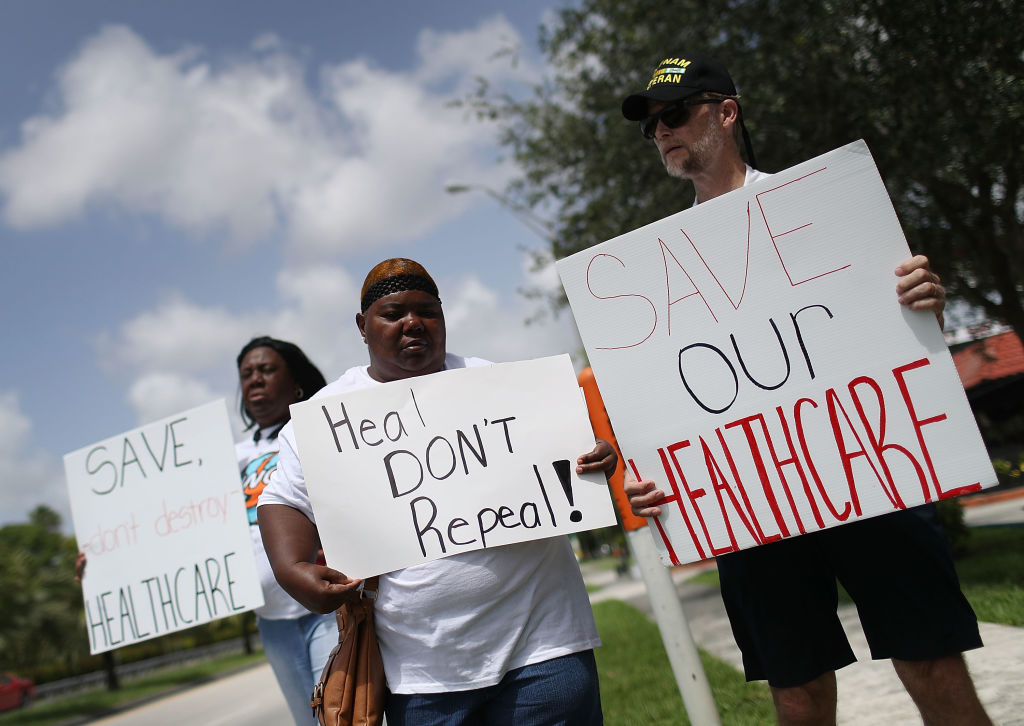51 percent of Trump supporters want Trump to try and make ObamaCare work


A free daily email with the biggest news stories of the day – and the best features from TheWeek.com
You are now subscribed
Your newsletter sign-up was successful
President Trump has been hammering Senate Majority Leader Mitch McConnell over the failure by Senate Republicans to pass an ObamaCare repeal plan, and he's urged the Senate to take back up repeal-and-replace legislation before moving on to other big legislation. Only 34 percent of Americans agree with him, while 62 percent favor moving on, including 47 percent of Republicans, according to a Kaiser Family Foundation poll released Friday. A 60 percent majority said it is a "good thing" the Senate failed to pass an ObamaCare repeal bill, 51 percent say they're "relieved," 47 percent are "happy," 38 percent "disappointed," and 19 percent "angry."
Meanwhile, 57 percent of Americans said they want Republicans to work with Democrats to improve the law. And not only do 78 percent of Americans want the Trump administration to do what it can to make ObamaCare work, but that includes 52 percent of Republicans and 51 percent of Trump supporters.
Overall, 52 percent of respondents now approve of ObamaCare — a 9 point jump since Trump's election — while 39 percent disapprove. Sixty percent of respondents said that Trump and Republicans are responsible for the Affordable Care Act, but only 36 percent of Republicans and Trump supporters agreed with that proposition, with 56 percent and 53 percent, respectively, saying Democrats and former President Barack Obama are responsible.
The Week
Escape your echo chamber. Get the facts behind the news, plus analysis from multiple perspectives.

Sign up for The Week's Free Newsletters
From our morning news briefing to a weekly Good News Newsletter, get the best of The Week delivered directly to your inbox.
From our morning news briefing to a weekly Good News Newsletter, get the best of The Week delivered directly to your inbox.
Trump has suggested he might scrap subsidies that help insurance companies insure seven million low-income people to get Democrats to come to the negotiating table, but 63 percent of respondents disagree with such hardball tactics, though 58 percent of Republicans approve. Strong majorities disapprove of Trump trying weaken the ObamaCare marketplace by cutting off advertising and outreach, though 66 percent of Republicans favor not enforcing the individual mandate (overall, Americans disapprove of that tactic, 65 percent to 31 percent). The uncertainty is already raising premiums, according to a separate KFF study.
The growing support for the law, and opposition to undermining it, among independents might "help explain why some centrist Republicans who rely on moderate voters' support opposed repeal or backed it only after winning some concessions," The Associated Press suggests. The poll was conducted Aug. 1-6, after the Senate repeal failure, among 1,211 adults, and it has a margin of error of ±3 percentage points.
A free daily email with the biggest news stories of the day – and the best features from TheWeek.com
Peter has worked as a news and culture writer and editor at The Week since the site's launch in 2008. He covers politics, world affairs, religion and cultural currents. His journalism career began as a copy editor at a financial newswire and has included editorial positions at The New York Times Magazine, Facts on File, and Oregon State University.
-
 How the FCC’s ‘equal time’ rule works
How the FCC’s ‘equal time’ rule worksIn the Spotlight The law is at the heart of the Colbert-CBS conflict
-
 What is the endgame in the DHS shutdown?
What is the endgame in the DHS shutdown?Today’s Big Question Democrats want to rein in ICE’s immigration crackdown
-
 ‘Poor time management isn’t just an inconvenience’
‘Poor time management isn’t just an inconvenience’Instant Opinion Opinion, comment and editorials of the day
-
 Trump HHS slashes advised child vaccinations
Trump HHS slashes advised child vaccinationsSpeed Read In a widely condemned move, the CDC will now recommend that children get vaccinated against 11 communicable diseases, not 17
-
 FDA OKs generic abortion pill, riling the right
FDA OKs generic abortion pill, riling the rightSpeed Read The drug in question is a generic version of mifepristone, used to carry out two-thirds of US abortions
-
 RFK Jr. vaccine panel advises restricting MMRV shot
RFK Jr. vaccine panel advises restricting MMRV shotSpeed Read The committee voted to restrict access to a childhood vaccine against chickenpox
-
 Texas declares end to measles outbreak
Texas declares end to measles outbreakSpeed Read The vaccine-preventable disease is still spreading in neighboring states, Mexico and Canada
-
 RFK Jr. shuts down mRNA vaccine funding at agency
RFK Jr. shuts down mRNA vaccine funding at agencySpeed Read The decision canceled or modified 22 projects, primarily for work on vaccines and therapeutics for respiratory viruses
-
 Measles cases surge to 33-year high
Measles cases surge to 33-year highSpeed Read The infection was declared eliminated from the US in 2000 but has seen a resurgence amid vaccine hesitancy
-
 Kennedy's vaccine panel signals skepticism, change
Kennedy's vaccine panel signals skepticism, changeSpeed Read RFK Jr.'s new vaccine advisory board intends to make changes to the decades-old US immunization system
-
 Kennedy ousts entire CDC vaccine advisory panel
Kennedy ousts entire CDC vaccine advisory panelspeed read Health Secretary RFK Jr. is a longtime anti-vaccine activist who has criticized the panel of experts
